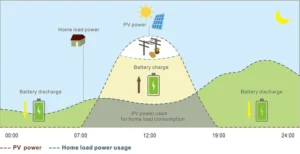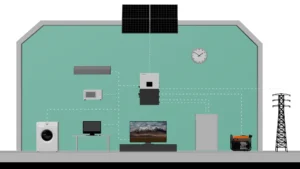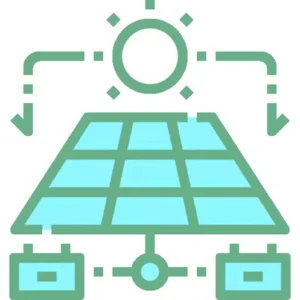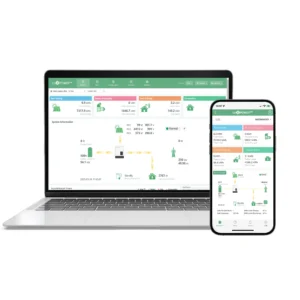We are all familiar with solar energy and its workings, right? But did you know solar inverters are critical for making electricity from solar energy? There are some types of solar inverters available. Hybrid and typical solar inverters are both widely used technologies in this case. You’re looking for the most efficient solution if you’re reading this article. It’s essential to grasp the “Hybrid Solar Inverter vs Solar Inverter .”
Let’s begin by going over the fundamentals of these two technologies. In section 3, we’ll examine each type’s pros and cons. We want to ensure that you have all the knowledge you need to make the best choice for solar inverters. Our goal is to assist you in making informed choices.
What Is Normal Solar Inverter?
A PV inverter, which stands for photovoltaic inverter, is another title for a solar inverter. This solar inverter aims to change direct current (DC) into alternating current (AC). Most of the time, solar panels are what make DC power. A hybrid solar inverter has more features than a normal one. That’s the reason regular solar inverters are so cheap. Customers who are careful with their money will like them a lot. But these inverters might also have more features like tracking, communication, and net metering.
There are some things that a regular solar inverter doesn’t have that a hybrid solar inverter does. Some of these are storing energy, moving power in both directions and controlling energy.
What Is a Hybrid Solar Inverter?

This type of solar inverter usually has a solar inverter and a battery generator. It’s a small form that has both functions. This setup lets you control power from solar panels, batteries, and electrical lines.
Let’s picture what happened above. The inverter sends extra energy to charge the attached battery during the peak sunlight of the day. With net metering, you can get points for your extra energy. On the other hand, when solar output isn’t enough, the inverter uses energy stored in the batteries. Because of this, it can meet the power needs. Theoretically, this dual ability allows power to stay on even when the power grid goes down.
What is the Difference between Hybrid Solar Inverter and Regular Solar Inverter?
In the green energy industry, hybrid and solar converters are standard. Conversely, hybrid solar inverters are easier to use than regular solar inverters. The table below shows how a typical and hybrid solar inverter differs. It used ten main points to show how these two systems were different.
Hybrid Solar Inverters vs Solar Inverters: Summary Table
| Aspect | Hybrid Solar Inverters | Normal Solar Inverter |
| Power flow direction | This system can deal with energy to be both imported from & to the grid. | Typical solar inverters allow only one-way power flow. |
| Energy Storage | Offers excellent solutions for energy storage (batteries) | No energy storage capabilities |
| Grid dependency | Hybrid solar inverters offer both grid-tied & off-grid functionality. | Typical solar intervals are typically grid-dependent for continuous operation. |
| Working Principle | Manages power flow from solar panels and batteries | Converts DC to AC directly from solar panels |
| Backup Power | Provides backup during grid outages | Relies on external backup systems for power outages |
| Productivity | More productive since it doesn’t waste generated energy | Less productive than hybrid solar inverters |
| Efficiency | Optimizes energy usage with stored power | Efficiency depends on real-time solar energy output |
| Cost | More expensive | Less expensive |
| Net metering compatibility | Compatible, enhancing the benefits of net metering | May have limitations in net metering integration |
| Monitoring & Communication | Advanced features for system monitoring and control | Basic monitoring capabilities for system performance |
| Resilience During outages | Provides uninterrupted power during grid failure | Requires external backup solutions for resilience |
Hybrid Solar Inverter vs Solar Inverter: Which is Better?

Energy storage provides crucial advantages in solar energy systems.
First, it typically allows you to store the excess energy generated during peak sunlight hours.
Therefore, the power management in your house can ensure continuous power supply during low or no sunlight.
Second, energy storage also enhances grid stability and facilitates load balancing.
Concerning energy storage, hybrid solar inverters and standard solar inverters play distinctive roles.
Hybrid solar inverters convert DC to AC and manage the charging and discharging of batteries. On the other hand, regular solar inverters lack this capability. It relies on grid supply or immediate solar generation.
Which is better? Indeed, hybrid solar inverters are the ideal choice for this feature.
Hybrid Solar Inverter vs Solar Inverter: Grid Dependency
Grid dependency means the reliance of a power system on the electrical grid for continuous operation. Concerning solar inverters, it indicates how much an inverter needs an adequate grid connection to work well. Well, reduced grid dependency is crucial in a sustainable energy system. Both hybrid and regular solar inverters come with on & off-grid features.
On-grid solar inverters synchronize with the grid when there is no sunlight or a lack of enough power from the solar panel. Conversely, off-grid solar panels are independent. It meets the energy needs without a grid connection. Similarly, hybrid inverters also feature both off & on-grid solar inverters.
Which is better? It depends on the type of applications you are looking for. On-grid hybrid solar inverters are prevalent in household applications. On the other hand, off-grid solar inverters are suitable for remote applications.
Hybrid Solar Inverter vs Solar Inverter: Power flow

In solar systems, the power flow means the direction in which electrical energy travels. In the highest cases, these directions are solar panels, batteries, and grids. Traditional solar inverters typically allow one-directional flow. Conversely, hybrid solar inverters offer bi-directional flow. This means they can quickly switch between solar and battery power.
The bi-directional flow capability in hybrid solar inverters offers numerous advantages.
First, it enhances energy flexibility. It allows the system to adapt to varying demand and availability.
Second, the excess energy can be stored in the batteries during peak sunlight. Consequently, it reduces reliance on the grid during cloudy periods or at night.
Third, the bi-directional functionality ensures optimal energy utilization.
Which is better? Indeed, hybrid solar inverters are better for their excellent bi-directional power flow feature.
Hybrid Solar Inverter vs Solar Inverter: Net Metering
Net metering is a billing mechanism. It often lets you obtain credits for surplus power generated by your system and sent back into the grid. The capacity to reduce power costs by exporting extra energy is the primary advantage of this technique. Technically, it helps to create a more sustainable and cost-effective energy ecosystem.
Concerning solar inverters, both systems can deal with net metering mechanisms. However, hybrid solar inverters offer enhanced functionalities and energy storage. It may provide greater flexibility in managing surplus energy.
Which is better? Both solar inverters are ideal for managing net metering. However, hybrid solar inverters offer more features.
Hybrid Solar Inverter vs Solar Inverter: Monitoring & communication features

Why are real-time insights necessary? Because it allows you to monitor energy production, consumption, and storage levels. You can also track the performance of your device at your home, office, or shop. If you find any unusual activity, you can have enough time to solve the issue. We can see this feature in both types of solar inverters. But, in hybrid solar inverters, this feature comes with advanced functionality.
Which is better? Both solar inverters offer excellent monitoring & communication features. However, hybrid solar inverters provide more functionalities.
Hybrid Solar Inverter vs Solar Inverter: Budget Constraints
Regular solar inverters cost less than hybrid solar inverters most of the time. Regular solar inverters are more accessible to put together. Their only job is to change the DC power that solar panels make into AC power that your home can use. The traditional method does not include parts that store energy like batteries. On top of that, these converters only do a few things.
Which is better? Indeed, traditional solar inverters are ideal for budget-conscious customers. However, balancing the cost with efficiency, productivity, and features is also necessary.
Frequently Asked Questions
Q1. What type of inverter is best for solar?
Answer: Hybrid inverters are said to be the best for solar. They combine many forms of solar technology into a smaller & more affordable device.
Q2. Can you use a solar inverter with a wind turbine?
Answer: Solar & wind turbine inverters are engineered differently to handle distinct power characteristics. However, using a solar inverter with a wind turbine is still possible. But in these cases, you must have a hybrid inverter supporting both renewable energy sources.
Q3. Do hybrid inverters need MPPT?
Answer: Yes, hybrid inverters typically include Maximum Power Point Tracking (MPPT) technology. It optimizes the efficiency of both solar panels & battery charging. Ultimately, it ensures maximum energy harvest from varying conditions.
Q4. Are hybrid solar inverters 100% efficient?
Answer: No solar inverters can be 100% efficient. However, Lux Powertek hybrid solar inverters can ensure up to 97% efficiency. It is considered the best quality in the world.
Summary
Let’s wrap up everything! Both hybrid and traditional solar inverters are popular in the modern world. Especially in developed countries, the use of sustainable energy is more common. Lux Power Tek is a renowned brand in this sector. Their hybrid solar inverters are among the best solar products in the world, especially in the USA and Europe.
Above all, if you have any questions, feel free to contact our customer support team.

